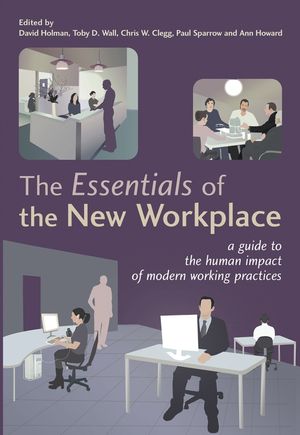The Essentials of the New Workplace: A Guide to the Human Impact of Modern Working PracticesISBN: 978-0-470-02215-3
Paperback
272 pages
December 2004
 This is a Print-on-Demand title. It will be printed specifically to fill your order. Please allow an additional 10-15 days delivery time. The book is not returnable.
|
||||||
Toby D.Wall is Professor of Psychology at the University of Sheffield, where he is director of the Institute of Work Psychology and the ESRC Centre for Organisation and Innovation. He obtained his first degree and his doctorate from the University of Nottingham. his main research interest have been in industrial and Organisational psychology and have re4cently focused on the effects of advanced manufacturing technology and shop floor work organisation on work performance and strain. His research has appeared in the Journal of Applied Psychology, the Academy of Management Journal and other leading publications. He is also the author of several books including The Human Side of Advanced Manufacturing Technology and Job and Work Design.
Chris W. Clegg is Professor of Organisational Psychology and Deputy Director of the Institute of Work Psychology at the University Sheffield. He is a Co-Director of the ESRC Centre for Organisation and Innovation and Co-Director of the BAE- Rolls-Royce University Technology Partnership for Design. He currently chairs the Sociotechnical Sub-Group of the British computer Society. He holds a BA (Hons) in Psychology from the University of Bradford. He is a Fellow of the British Psychological Society, a Fellow of the Royal Society of Arts, and a chartered psychologist. His research interest are in the areas of new technology, work organisation, information and control systems, sociotechnical theory and new management practices. He has published his work in a number of books and journals.
Paul Sparrow is the Ford Professor of International Human resource Management at Manchester Business School. He graduated from the University of Manchester with a BSc (Hons) in Psychology and the University of Aston with an MSc in Applied Psychology and was then sponsored by Rank Xerox to study the impacts of ageing on the organisation for his Ph.D. at Aston University. He has written and edited a number of books including European Human Resource Management in Transition, The competent Organization: A Psychological Analysis of the Strategic Management Process, Human Resource Management: The New Agenda, International Human resource Management and Globalizing Human Resource Management. He has also published articles in leading journals on the future of work, human resource strategy, the psychology of strategic management, international human resource management and cross-cultural management. He is the former Editor of the Journal of Occupational and Organisational Psychology.
Ann Howard is Manger of Assessment Technology Integrity for Development Dimensions International (DDI), a leading provider of human resource programs and services. She has served a president of the Leadership Research Institute, a non-profit organization that she served as president of the Leadership research Institute, a non-Profit organization that she co-founded in 1987. Ann is the author of more than 85 publications on topics such as assessment centers, management selection, managerial careers, and leadership. She is the senior author (with Dr Douglas W. Bray) of Managerial Lives in Transition: Advancing Age and Changing Times, which received the George R. Terry Award of Excellence from the Academy of Management in 1989. She has edited two books: The Changing Nature of Work (1995) and Diagnosis for Organizational change: Methods and Models (1994). She is a past president of the Society for Industrial and Organizational Psychology and the Society of Psychologist in Management. Ann received her Ph.D. degree from the University of Maryland and her MS degree from San Francisco State university, both in industrial organizational psychology. She holds an honorary doctor of science degree from Goucher College, where she earned a BA degree in psychology.



